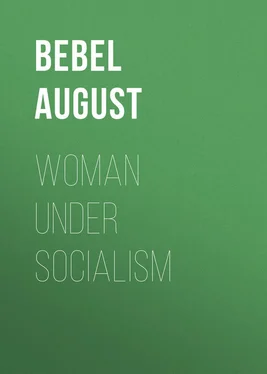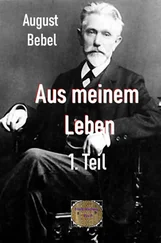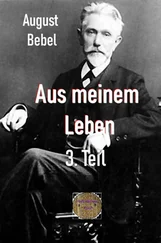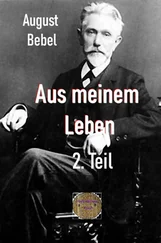August Bebel - Woman under socialism
Здесь есть возможность читать онлайн «August Bebel - Woman under socialism» — ознакомительный отрывок электронной книги совершенно бесплатно, а после прочтения отрывка купить полную версию. В некоторых случаях можно слушать аудио, скачать через торрент в формате fb2 и присутствует краткое содержание. ISBN: , Жанр: foreign_antique, foreign_prose, на английском языке. Описание произведения, (предисловие) а так же отзывы посетителей доступны на портале библиотеки ЛибКат.
- Название:Woman under socialism
- Автор:
- Жанр:
- Год:неизвестен
- ISBN:http://www.gutenberg.org/ebooks/30646
- Рейтинг книги:5 / 5. Голосов: 1
-
Избранное:Добавить в избранное
- Отзывы:
-
Ваша оценка:
- 100
- 1
- 2
- 3
- 4
- 5
Woman under socialism: краткое содержание, описание и аннотация
Предлагаем к чтению аннотацию, описание, краткое содержание или предисловие (зависит от того, что написал сам автор книги «Woman under socialism»). Если вы не нашли необходимую информацию о книге — напишите в комментариях, мы постараемся отыскать её.
Woman under socialism — читать онлайн ознакомительный отрывок
Ниже представлен текст книги, разбитый по страницам. Система сохранения места последней прочитанной страницы, позволяет с удобством читать онлайн бесплатно книгу «Woman under socialism», без необходимости каждый раз заново искать на чём Вы остановились. Поставьте закладку, и сможете в любой момент перейти на страницу, на которой закончили чтение.
Интервал:
Закладка:
At any rate, however the genius of our descendants may shape matters on this head, one thing is certain: Woman – the race's mothers, wives, sisters, daughters – long sinned against through unnumbered generations – is about to be atoned to. All the moral and intellectual forces of the age are seen obviously converging to that point. It will be the crowning work of Militant Socialism, like a mightier Perseus, to strike the shackles from the chained Andromeda of modern society, Woman, and raise her to the dignity of her sex.
DANIEL DE LEON.New York, June 21, 1903.
INTRODUCTION
We live in the age of a great social Revolution, that every day makes further progress. A growingly powerful intellectual stir and unrest is noticeable in all the layers of society; and the movement pushes towards deep-reaching changes. All feel that the ground they stand on shakes. A number of questions have risen; they occupy the attention of ever widening circles; and discussion runs high on their solution. One of the most important of these, one that pushes itself ever more to the fore, is the so-called "Woman Question."
The question concerns the position that woman should occupy in our social organism; how she may unfold her powers and faculties in all directions, to the end that she become a complete and useful member of human society, enjoying equal rights with all. From our view-point, this question coincides with that other: – what shape and organization human society must assume to the end that, in the place of oppression, exploitation, want and misery in manifold forms, there shall be physical and social health on the part of the individual and of society. To us, accordingly, the Woman Question is only one of the aspects of the general Social Question, which is now filling all heads, which is setting all minds in motion and which, consequently, can find its final solution only in the abolition of the existing social contradictions, and of the evils which flow from them.
Nevertheless, it is necessary to treat the so-called Woman Question separately. On the one hand the question, What was the former position of woman, what is it to-day, and what will it be in the future? concerns, in Europe at least, the larger section of society, seeing that here the female sex constitutes the larger part of the population. On the other hand, the prevailing notions, regarding the development that woman has undergone in the course of centuries, correspond so little with the facts, that light upon the subject becomes a necessity for the understanding of the present and of the future. Indeed, a good part of the prejudices with which the ever-growing movement is looked upon in various circles – and not least in the circle of woman herself – rests upon lack of knowledge and lack of understanding. Many are heard claiming there is no Woman Question, because the position that woman formerly occupied, occupies to-day and will in the future continue to occupy, is determined by her "natural calling," which destines her for wife and mother, and limits her to the sphere of the home. Accordingly, whatever lies beyond her four walls, or is not closely and obviously connected with her household duties, concerns her not.
On the Woman Question, the same as on the general Social Question, in which the position of the working class in society plays the chief role, opposing parties stand arrayed against each other. One party, that which would leave everything as it is, have their answer ready at hand; they imagine the matter is settled with referring woman to her "natural calling." They forget that, to-day, for reasons later to be developed, millions of women are wholly unable to fill that "natural calling," so much insisted upon in their behalf, of householders, breeders and nurses of children; and that, with other millions, the "calling" has suffered extensive shipwreck – wedlock, to them, having turned into a yoke and into slavery, compelling them to drag along their lives in misery and want. Of course, this fact concerns those "wise men" as little as that other fact, that unnumbered millions of women, engaged in the several pursuits of life, are compelled, often in unnatural ways, and far beyond the measure of their strength, to wear themselves out in order to eke out a meager existence. At this unpleasant fact those "wise men" stuff their ears, and they shut their eyes with as much violence as they do before the misery of the working class, consoling themselves and others with "it has ever been, and will ever remain so." That woman has the right to share the conquests of civilization achieved in our days; to utilize these to the easing and improving of her condition; and to develop her mental and physical faculties, and turn them to advantage as well as man, – they will none of that. Are they told that woman must also be economically, in order to be physically and intellectually free, to the end that she no longer depend upon the "good-will" and the "mercy" of the other sex? – forthwith their patience is at end; their anger is kindled; and there follows a torrent of violent charges against the "craziness of the times," and the "insane emancipational efforts."
These are the Philistines of male and female sex, incapable of finding their way out of the narrow circle of their prejudices. It is the breed of the owls, to be found everywhere when day is breaking, and they cry out in affright when a ray of light falls upon their comfortable darkness.
Another element among the adversaries of the movement cannot shut its eyes before the glaring facts. This element admits that there was hardly a time when a larger number of women found themselves in so unsatisfactory a condition as to-day, relatively to the degree of general civilization; and they admit that it is therefore necessary to inquire how the condition of woman can be improved, in so far as she remains dependent upon herself. To this portion of our adversaries, the Social Question seems solved for those women who have entered the haven of matrimony.
In keeping with their views, this element demands that, to unmarried woman, at least, all fields of work, for which her strength and faculties are adequate, shall be opened, to the end that she may enter the competitive field for work with man. A small set goes even further, and demands that competition for work be not limited to the field of the lower occupations, but should also extend higher, to the professions, to the field of art and science. This set demands the admission of woman to all the higher institutions of learning, namely, the universities, which in many countries are still closed to her. Their admission is advocated to the classes of several branches of study, to the medical profession, to the civil service (the Post Office, telegraph and railroad offices), for which they consider women peculiarly adapted;, and they point to the practical results that have been attained, especially in the United States, through the employment of woman. The one and the other also make the demand that political rights be conferred upon woman. Woman, they admit, is human and a member of the State, as well as man: legislation, until now in the exclusive control of man, proves that he exploited the privilege to his own exclusive benefit, and kept woman in every respect under guardianship, a thing to be henceforth prevented.
Читать дальшеИнтервал:
Закладка:
Похожие книги на «Woman under socialism»
Представляем Вашему вниманию похожие книги на «Woman under socialism» списком для выбора. Мы отобрали схожую по названию и смыслу литературу в надежде предоставить читателям больше вариантов отыскать новые, интересные, ещё непрочитанные произведения.
Обсуждение, отзывы о книге «Woman under socialism» и просто собственные мнения читателей. Оставьте ваши комментарии, напишите, что Вы думаете о произведении, его смысле или главных героях. Укажите что конкретно понравилось, а что нет, и почему Вы так считаете.












